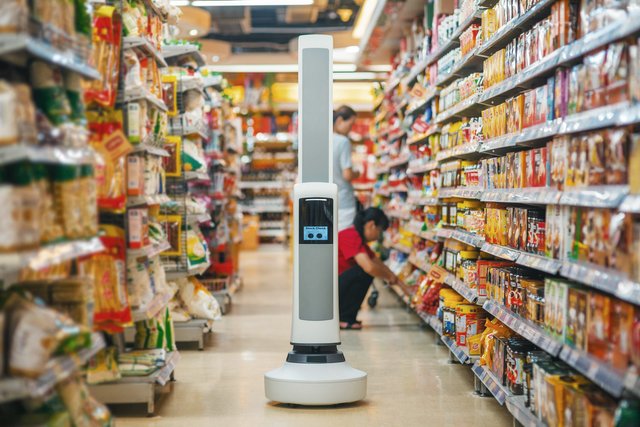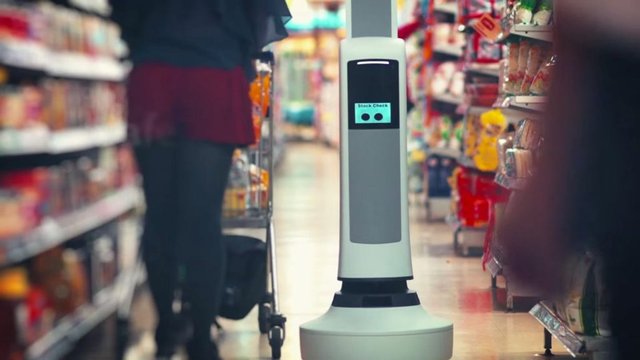
Losing our jobs to robots is no longer a topic of vague interest; it is now a very real situation, one further evidenced by the introduction of Tally, the newest automated shelf-auditing and analytics system slated to hit grocery stores soon. Developed by Simbe Robotics, Tally is the world’s first robot to capture, report, and analyze stocks so that stores maximize their sales. Tally will regularly move around grocery stores, scanning shelves to determine out-of-stock, low-stock, or misplaced items. It would also be able to check for pricing errors. The inherent cost-effectiveness and efficiency of Tally means the potential unemployment of hundreds of thousands of workers.
The genius of Tally is in its design. Tally operates on a cloud-powered software platform and API using an open source Robot Operating System (ROS). It stands at 38 inches tall but can be adjusted according to the store’s preference and shelf height requirements. The robot requires no supervision and can independently move to its own charging dock for continuous operation. Information captured by Tally would be uploaded to a secured cloud for processing. Access to this storage would be given to managers and/or key stakeholders, depending on the retailer in question.
Brad Bogolea, CEO and co-founder of Simbe Robotics said in their official press release, “When it comes to the retail industry, shopper experience is everything. If a product is unavailable at the time the shopper wants to buy it, the retailer has missed an opportunity and disappointed their customer. Tally helps retailers address these challenges by providing more precise and timely analysis of the state of in-store merchandise and freeing up staff to focus on customer service.”
The last part is what robotics manufacturers say to counter arguments of their products prompting a massive unemployment rate for human workers. Repetitive, mundane tasks performed by humans are not only expensive for corporations, they are also mostly inaccurate. A 2011 survey by Innovative Retail Technologies revealed that 70 percent of retailers described themselves as “average” or “below average” on their inventory management. This included identifying out-of-stock or misplaced items. The analysis also concluded that only a third of retailers had reliable tools for inventory tracking.

Human workers, for all their benefits, still make mistakes. These flaws have the potential to impact revenue. From a business perspective, this can be addressed by hiring an entirely autonomous system. This frees up human employees to focus on tasks better-suited for them, such as customer relations.

What can be automated, will be
Industry analysts foresee a future that will feature scores of jobs being done by robots. The most impacted industry is the retail market, where millions of unskilled workers try their hand at employment. Already major stores such as Target, Wal Mart, Home Deport, CVS, and Costco are using self-checkout devices. There is also speculation that with the impending Amazon-Whole Foods merger, human checkout cashiers will be completely non-existent. (Related: SORRY, HUMANS: Amazon will most likely replace Whole Foods cashiers with automated systems.)
The expansion is not limited to physical stores. Global companies are transitioning large parts of their operations to the online environment. Mobile ordering and payment schemes offer more convenience for customers while being less costly for the company. This translates to improved operations, with less need for a mortar-or-brick store or human workers. It is a win-win situation for businesses.
Nevertheless, most companies say that the move is not the end of the human employment but an indication of growth. They reason that with robots now handling “basic” tasks, we can concentrate on higher levels of thinking. Thanks go to Natural News for providing this content.
I understand why people think we need universal basic income but believing that the government is going to pay us for just existing when health care and education are still not fully subsidized in most countries is naive. Plus where are they going to get the money to pay that universal income anyways?
Automation will bring prices down and ideally people will have to work less to make a living, so where we had one worker doing 8 hour shifts we might end up having 2 people working 4 hours and still making enough to live comfortably. And at the same time, new industries will arise for people to get entertained during this newly adquired free time.
Now the question is, should robots pay taxes?
Downvoting a post can decrease pending rewards and make it less visible. Common reasons:
Submit
My grandfather always said he didn't understand how we had all this technology and computers but still worked as hard or even harder than when he was young. It's time for us to chill a little and let the robots do the heavy lifting.
Downvoting a post can decrease pending rewards and make it less visible. Common reasons:
Submit
This is why investing in technology now is so important. In the not too distant future it will be very hard to sell your labor. Also a good reason to support and push universal basic income.
Downvoting a post can decrease pending rewards and make it less visible. Common reasons:
Submit
I believe low-wage jobs should be done by robots if possible and this is a step in the right direction good find.
Downvoting a post can decrease pending rewards and make it less visible. Common reasons:
Submit